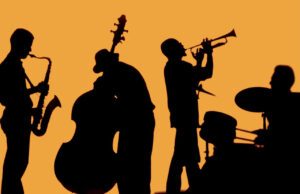Jazz One brings lessons home from State
This jazz season, although hard at times, has been a very successful one. Jazz One finished out the year in eighth place of the 4A schools at the Iowa Jazz Championships on April 2 in Ames.
This was a slight disappointment to some, after coming in seventh place the previous year.
Senior Chase Kline said, “I think the reason that we didn’t place the way that we wanted to is because of the way that we run our jazz program. We switch out and change up our set multiple times throughout the year, so we don’t have the same time other schools do to polish and perfect all of our songs.”
But junior Sofia Muñoz said the trade off is worth it. “We came away from the experience having a more valuable time. We went through our season playing more songs and building our repertoire as opposed to just perfecting certain pieces, so our experience of jazz overall is more impactful than what I would perceive as other schools.”
For Jazz One, winning isn’t everything. What matters most to them is the sense of family and the interesting musical literature that they got to play throughout the year.
Senior William Simms said that the best part about this jazz season was “getting to learn and grow more as musicians to develop the skills you need to keep on going with music.”
This consensus is shared with most, if not all, jazz players.
Muñoz said, “The best part about jazz is the feeling of community that you get when you spend so many hours with each other.”
Jazz One had the unique opportunity of having not one but two songs commissioned for them this year. The first being “Dangerous Times” by Chris Merz and the second was “Battle Cry” by Ryan Kisor, arranged by Steve Shanley.
Sophomore Eli Smith said, “Playing ‘Dangerous Times’ by Chris Mertz, and ‘Battle Cry’ arranged by Steve Shanley, was an amazing opportunity because we were the first ones to play the tunes, leaving it up to us to interpret lots of things about the tunes.”
This year’s Jazz One is made up of many seniors, something that will have a drastic effect on the dynamic of the band. However, this is not a daunting subject for any of the players. In fact, many of them embrace the change that is going to come.
“We’re losing a few very important leaders from our group, so it’ll be interesting to see different people stepping up and into those positions,” Muñoz said. “It does feel like a part of you is going to be missing next year when half of the band isn’t there, but then we get to create more experiences with others as well.”
Sophomore Eli Smith said, “Jazz One next year will be much different, with nearly half the band being replaced, but it is definitely not a negative thing. Although the band will be younger and maybe less experienced, a young band presents the opportunity to grow together. It additionally challenges the less experienced players with harder music and higher expectations, which is a great learning opportunity.”
This same sentiment is shared with Jazz One director Kyle Engelhardt. He said, “We have a lot of depth and talent in the jazz program at Cedar Falls, thanks to our outstanding jazz teachers in the junior high and high school. Every year is different—we usually graduate 30-50 percent of Jazz One, and everything ends up working out just fine.”
If someone wishes to join Jazz One next year, the best advice anyone could give is to practice and put effort into what is being played. Jazz isn’t only a show of talent, but also of character.
“The audition is important, but don’t stress it. The band directors know you as a player, and it is not solely the audition that is going to determine who’s in and who’s out,” Muñoz said.
Smith had a similar tip. “Anyone who wants to make Jazz One simply needs to practice and listen as much as they can. There’s really no shortcuts.”
Junior Shelby Conditt said the most important thing to work on is soloing. She said, “Focus on soloing. A lot of people in Jazz One are at the same technical difficulty level, but if you work on your phrasing, it will set you apart. It’s sort of like creating your own story.”
Engelhardt said, “Be the best at your instrument—playing jazz is like studying a language, and you need a good vocabulary and solid skills to succeed at playing jazz well. Amass a variety of experiences—audition for all-state, audition for honor bands, take private lessons, attend jazz camps and work to better yourself every day. When you’re not practicing, listen to the music and embrace the art form.”
According to Simms, the continued effort and hard work put into creating a top jazz band does not need to end when the season ends. “I think it gets forgotten that music doesn’t end with the end of the school year or the end of 12th grade. For those who are passionate about it, it goes on forever.”









You must be logged in to post a comment Login